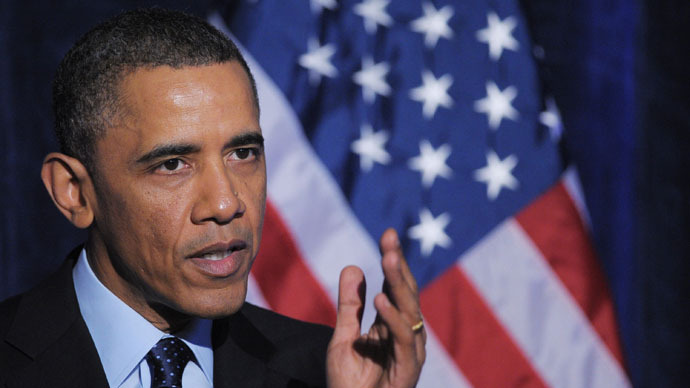Obama’s Endgame: War with Iran?

Will launching a catastrophic military offensive against the Islamic Republic of Iran be the defining moment of US President Obama’s two-term presidency?
Against all common sense and uncommon wisdom, it looks increasingly possible that Barack Obama, the Democratic leader who once-upon-a-campaign seduced the world by pledging to “sit down and talk with America’s enemies,” will resort to armed conflict to stamp out Tehran’s nascent nuclear program.
Or were Obama’s comments on Iran this week the latest bluff in the geopolitical poker game known as the Middle East?
"I have been crystal clear about my position on Iran possessing a nuclear weapon. That is a red line for us. It is not only something that would be dangerous for Israel. It would be dangerous for the world," Obama told Israeli Channel 2 ahead of a scheduled visit next week with Israeli Prime Minister Benjamin Netanyahu.
"Right now, we think that it would take over a year or so for
Iran to actually develop a nuclear weapon," Obama said, while
not neglecting to add the “all options remain on the
table” caveat.

For all the talk of a disconnect, Obama and Netanyahu are beginning to display some strong parallels in their position on Iran – despite what the US intelligence community thinks on the subject.
Rewind to December 2007 when the United States released its National Intelligence Estimate (NIE) on Iran, which represents the consensus view of all 16 American spy agencies. That assessment unequivocally concluded that Iran halted its nuclear weapons program in 2003.
The estimate declared with “high confidence” that an Iranian program intended to transform raw material into a nuclear weapon “has been dismantled since 2003,” adding that the halt “was directed primarily in response to increasing international scrutiny and pressure.”
The NIE estimate stated matter-of-factly that Iran’s enrichment program could still provide Tehran with enough raw materials to produce a nuclear weapon “sometime by the middle of next decade” – a timetable that was essentially consistent with previous estimates.
Rather than portraying Iran as a rogue country hell-bent on acquiring nuclear weapons, the 2007 NIE estimate stated that Iran’s “decisions are guided by a cost-benefit approach rather than a rush to a weapon irrespective of the political, economic and military costs.”
That is certainly not the usual image of Iran that we have seen in the Western media.
It needs to be remembered that this very un-apocalyptic version of Iran’s nuclear capacities was released in the hyper-hawkish Bush years, a period when the US war machine was in high gear in the War on Terror. In fact, the tepid conclusions of the Bush-era assessment eventually forced the Obama administration to tone down its missile defense plans in Western Europe, which had been devised specifically with roguish Iran in mind.
This week, US National Intelligence Director James Clapper said Tehran has made progress in its nuclear program, but "we assess Iran could not divert safeguarded material and produce a weapon-worth of WGU [weapons-grade uranium] before this activity is discovered.”
Iran's nuclear sites are subject to monitoring from the International Atomic Energy Agency (IAEA), as well as secret surveillance from US and other intelligence services.

Meanwhile, Obama’s threat of imposing a “red line” with regards to Iran’s nuclear program carried unmistakable echoes of Netanyahu’s UN speech in September where the Israeli PM, armed with a cartoon of a bomb complete with burning fuse, spoke of drawing a “clear red line” that Iran should not be permitted to pass in terms of producing weapons-grade uranium.
Netanyahu warned that Iran could acquire “enough enriched uranium for its first bomb” as early as the spring-summer 2013 – a prediction that has not been revised despite recent UN reports that show Tehran has decreased its stockpiles of 20-percent fissile material.
The fissile material in nuclear weapons usually contains at least 85 percent of weapons-grade Uranium-235, which is far beyond Iran’s present enrichment levels of 20 percent.
Given the crippling effects of sanctions aimed at Iran, together with less diplomatic means of halting Tehran’s nuclear ambitions, as witnessed by the Stuxnet computer virus that attacked a uranium enrichment facility at Natanz, it seems that Netanyahu and Obama’s prediction for a nuclear weapon falls far short of reality.
In the meantime, the world is forced to contemplate whether Obama is simply playing up to the home crowd ahead of next week’s visit to Israel, or if the US leader is attempting to exert pressure on Tehran to give up on its nuclear research.
Finally, there is the possibility that Barack Obama really believes his own rhetoric and – as was the case with former Iraqi President Saddam Hussein, who was accused in 2003 of harboring weapons of mass destruction and paid with his life for the erroneous intelligence – the chances of a military misadventure in Iran seem to have increased dramatically.

With a domestic economy in shambles, the budget strained and the nation cracked politically down the middle between the haves and have-nots, will Barack Obama be tempted to drag the United States into a war with Iran as a memorable final act of his sagging presidency?
Perhaps not even Benjamin Netanyahu knows the answer to that question.
Robert Bridge for RT
The statements, views and opinions expressed in this column are solely those of the author and do not necessarily represent those of RT.
The statements, views and opinions expressed in this column are solely those of the author and do not necessarily represent those of RT.












